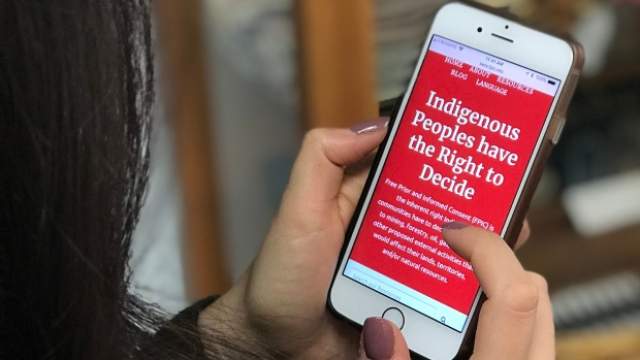New website aims to put info about resources consent in Indigenous peoples’ pocket

The website on Indigenous peoples' rights to free prior and informed consent over resource activity is both computer and mobile friendly for easy access. (Ryan Johnson/Six Nations Polytechnic)
Read Original Article By Rhiannon Johnson, CBC News
A website has launched that will provide Indigenous people throughout North and South America with the information to help exercise their rights to consent over what is done to their lands and territories.
Doubling as a mobile-friendly application, the website was developed with Indigenous people in collaboration with a number of academic institutions. It is hosted by Deyohahá:ge (Two Roads): The Indigenous Knowledge Centre at Six Nations Polytechnic in the territory of the Six Nations of the Grand River.
The right for Indigenous people to have free, prior and informed consent over what is done to their lands and territories is recognized throughout the United Nations Declaration on the Rights of Indigenous Peoples.
The site provides information and tools for Indigenous communities when faced with making a decision dealing with third party organizations on issues such as resource extraction or development on their lands and territories.
Easy access
"The website is designed — and phone application as well — so that Indigenous people can have ready access to all these materials that are being written about their rights ... to make sure they have access to them, understand them and exercise them," said Terry Mitchell, a professor at Wifrid Laurier University.
Where does Canada sit 10 years after the UN Declaration on the Rights of Indigenous Peoples?
Give indigenous people veto power over development on their lands, report urges
Darren Thomas, a faculty member at the Wilfrid Laurier campus in Brantford who is Seneca and grew up in Six Nations, said making the information more available to grassroots community leadership and activists will better enable them to hold third parties to task.
Both Mitchell and Thomas are a part of the Indigenous Rights and Resource Governance Research Group (IRRG), which is made up of faculty, students and community members whose work focuses on the implementation of UNDRIP.
Sharing information
Bringing a greater understanding of what consent means for Indigenous communities, and governance is one of the goals of the website. It also aims to act as a hub, bringing together Indigenous communities from both North and South America to share information and experiences to better inform their own unique decision-making processes.
"Knowledge can be shared as this website becomes more active," said Mitchell.
"People can continue to share information but they can also [through the blog] be writing about real life situations and struggles."
While they might not have internet access in their home communities, when they travel into local centres, Indigenous people across North and South America are able to update their devices and applications.
"One of the things that we've noticed… not only in the North but certainly our colleagues in South America is regardless of whether or not Indigenous communities have access to the internet, in many locales they all have smartphones," said Thomas.
Also, having the website function on a mobile-friendly platform means that chiefs and leaders going into meetings can pick up their phones and access information or particular articles in UNDRIP easily, said Mitchell.
Much of the content is open access and downloadable for free, although some scholarly material requires institutional access.
Read Original Article By Rhiannon Johnson, CBC News
Related Project:
Categories
Latest news
- LifeMosaic’s latest film now available in 8 languages
- การเผชิญหน้ากับการสูญพันธุ์ และการปกป้องวิถีชีวิต (Thai)
- LANÇAMENTO DO FILME BRASIL : Enfrentando a Extinção, Defendendo a Vida
- Enfrentando la Extinción, Defendiendo la Vida (Español)
- Peluncuran video baru dalam Bahasa Indonesia : Menghadapi Kepunahan, Mempertahankan Kehidupan


